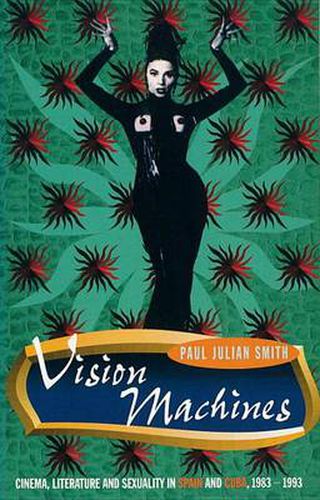Readings Newsletter
Become a Readings Member to make your shopping experience even easier.
Sign in or sign up for free!
You’re not far away from qualifying for FREE standard shipping within Australia
You’ve qualified for FREE standard shipping within Australia
The cart is loading…






Over the last decade, visibility and sexuality have become a major theme in Spanish and Cuban cinema, literature and art. Vision Machines explores this development in the light of contemporary history and recent theoretical accounts of sight by writers including Paul Virilio, Gianni Vattimo and Teresa de Lauretis. The very visible women of Almodovar’s cinema are Paul Julian Smith’s first subject. He shows how, in his early Dark Habits, lesbianizes the look, putting women’s pleasure at the centre of the frame, and then examines Almodovar’s recent film, Kika, where the conflict between cinema and video is played out in the bodies of women: good, bad and ugly. Moving the focus to Cuba, Smith discussed the reception in Europe and North America of Nestor Almendro’s remarkable documentary on gays in Cuba, Improper Conduct, and traces the trial of visibility to which effeminate men were exposed. He compares Amendor’s work with the autobiography of exile novelist Reinaldo Arenas, which revels in graphic sex, and also looks at the first Cuban film with a gay theme, Gutierrez Alea’s Strawberry and Chocolate. Smith returns to Spain to consider the response of artists and intellectuals to the public invisibility of AIDS in a country with one of the highest rates of HIV transmission in the Eurpean Union. Drawing on Anglo-American debates on the representation of AIDS, he concentrates on the one major intervention by Spanish scholars and artists, Love and Rage, and on the only figure in any medium to address AIDS in his aesthetic practice, the conceptual artist and video-maker Pepe Espaliu. He concludes with a fascinating account of Julio Medem’s pathbreaking film from 1993, The Red Squirrel, which has opened up a new approach to two formerly taboo subjects: Basque nationalism and female sexuality.
$9.00 standard shipping within Australia
FREE standard shipping within Australia for orders over $100.00
Express & International shipping calculated at checkout
Over the last decade, visibility and sexuality have become a major theme in Spanish and Cuban cinema, literature and art. Vision Machines explores this development in the light of contemporary history and recent theoretical accounts of sight by writers including Paul Virilio, Gianni Vattimo and Teresa de Lauretis. The very visible women of Almodovar’s cinema are Paul Julian Smith’s first subject. He shows how, in his early Dark Habits, lesbianizes the look, putting women’s pleasure at the centre of the frame, and then examines Almodovar’s recent film, Kika, where the conflict between cinema and video is played out in the bodies of women: good, bad and ugly. Moving the focus to Cuba, Smith discussed the reception in Europe and North America of Nestor Almendro’s remarkable documentary on gays in Cuba, Improper Conduct, and traces the trial of visibility to which effeminate men were exposed. He compares Amendor’s work with the autobiography of exile novelist Reinaldo Arenas, which revels in graphic sex, and also looks at the first Cuban film with a gay theme, Gutierrez Alea’s Strawberry and Chocolate. Smith returns to Spain to consider the response of artists and intellectuals to the public invisibility of AIDS in a country with one of the highest rates of HIV transmission in the Eurpean Union. Drawing on Anglo-American debates on the representation of AIDS, he concentrates on the one major intervention by Spanish scholars and artists, Love and Rage, and on the only figure in any medium to address AIDS in his aesthetic practice, the conceptual artist and video-maker Pepe Espaliu. He concludes with a fascinating account of Julio Medem’s pathbreaking film from 1993, The Red Squirrel, which has opened up a new approach to two formerly taboo subjects: Basque nationalism and female sexuality.